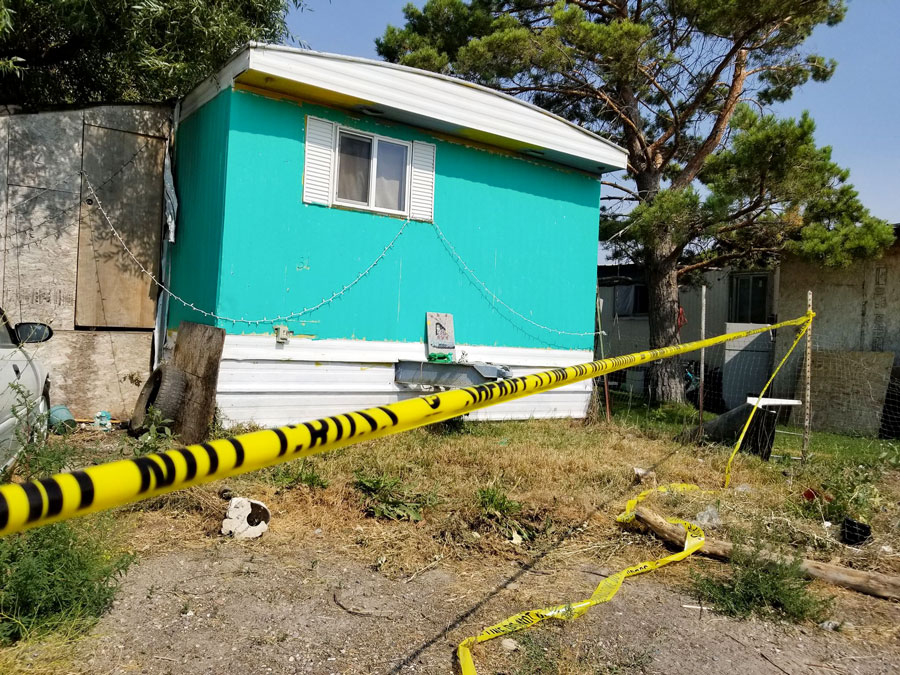Before he killed a man this week, court records show Zamora had violent past
Published at | Updated at
IDAHO FALLS — The outward image Pedro Zamora showed the world was a happy and normal one.
His social media pages are full of him smiling with friends and family. His most recent public post was about being incredibly proud of his brother for graduating high school.
Zamora posted lovingly about his toddler multiple times and about being optimistic for the future.
In his obituary, his family describes him as someone who loved to joke around and someone who “especially loved spending time with his son and all his family.”
Yet those images paint a stark contrast to the events of this week, when 20-year-old Zamora assaulted the mother of his child, and brutally killed Jorge Juarez with a shotgun in a mobile home on Arco Highway. He then fled to a remote lava field in Bonneville County, where he took his own life after a five-hour stand-off with police.
The murder-suicide has left many asking why this happened. And while we may never know Zamora’s exact motivation, there are indications Zamora had a temper and had been becoming increasingly violent.
On Thursday, a Bonneville County judge released Zamora’s juvenile criminal record to EastIdahoNews.com. It shows a clear escalation of criminal and violent behavior before he was incarcerated in 2015. There are also documents showing a judge considered Zamora be tried as an adult, due to his need for domestic violence treatment and based on the recommendation of his parole officer.
That didn’t happen though.
RELATED | Deputies: Man killed woman’s brother before assaulting, kidnapping her for hours.
Criminal history
The criminal behavior appears to have started in 2015, when Zamora was 17 years old. After a traffic stop, he was charged with felony driving without privileges, which was later amended to driving without a license.
But as the year progressed, Zamora had several other interactions with police involving violent crimes.
The first incident of domestic battery occurred in September 2015 against his then-pregnant girlfriend. His girlfriend is the same woman who was kidnapped by Zamora for several hours after he killed her brother. The charge, which was amended to battery, resulted in a 20-day jail sentence and a no-contract order with the victim.
At least one no-contact order violation occurred that month. Court documents show the victim and Zamora met willingly, despite the order not to.
Then on Oct. 10, a more serious incident occurred. Police reports show Zamora hit and strangled his pregnant girlfriend after breaking down the front door when she refused to let him into the home.
According to court documents, Zamora’s victim “was scared she was going to die.” When questioned by officers, Zamora admitted he punched and hit the victim at her house but could not remember strangling her “but believes he probably did.”
Police reports show his girlfriend suffered extensive bruising, a black eye and abrasions from the attempted strangulation.
The girlfriend was hospitalized, and Zamora was arrested and charged with felony strangulation, misdemeanor domestic battery, and violation of a no-contact order.
While being transported to a juvenile detention facility, Zamora told an officer he was jealous of his girlfriend talking to other guys after he looked through her phone. It is then when he said he “snapped.”
Zamora would eventually be found guilty of the felony attempted strangulation and be placed in a Juvenile Correction Center for just about two years. However, between the October incident and his incarceration in December, there was another incident of battery and several other no contact-order violations.
RELATED: Murder suspect kills himself in field
Option to move alleged crime to an adult court
During court hearings before Zamora was incarcerated, there were discussions that due to the seriousness of the felony attempted strangulation, the case should move from juvenile to adult criminal court.
In November 2015, Magistrate Judge Ralph Savage considered a motion to waive jurisdiction of the Juvenile Corrections Act. During a hearing the judge heard from Jeff Moulton, Zamora’s probation officer, who recommended Zamora not remain in the juvenile court system. The judge also considered if juvenile probation could meet Zamora’s needs, rather than detention.
Moulton’s main argument was the adult court system could provide better domestic violence treatment than the juvenile system. If he was in adult court he would be required to complete a 52-week domestic violence treatment program, obtain a GED or high school diploma and complete drug and alcohol treatment. Intensive domestic violence resources aren’t available in juvenile detention or probation, but juvenile inmates are given more support with completing high school while in juvenile correction.
The judge also considered that Zamora’s entire criminal history — at least 10 misdemeanors at the time of the finding of facts — had happened within just a few months. A number of the violations were no contact orders, which resulted in detention on more than one occasion.
The seriousness of the crime was weighed during the hearing. Excessively violent crimes like murder, rape, mayhem and assault or battery with the intent to commit these crimes are automatically moved to adult court. Felony attempted strangulation is not automatic, but since it could have resulted in death or serious bodily injured, it is a serious offense and suggests a violent behavior on the part of Zamora, the judge wrote in his findings of fact.
The judge wrote that attempted strangulation in adult court could have gotten Zamora up to 15 years in prison, while in juvenile court, he could only be held until he was 21 years old — a total of three and a half years.
Ultimately, Savage decided against putting Zamora in adult court and he recommended against juvenile probation.
Savage said juvenile probation wouldn’t work due to Zamora’s consistent and repeated violations of no contact orders and his tendency to fight with the victim.
Savage suggested long-term detention at a juvenile corrections center followed by outside domestic violence treatment, similar to what he’d have received in prison if found guilty in adult court. The judge felt Zamora had a strong family support system, and that juvenile corrections would be better suited for Zamora to complete his schooling. He also said the detention would “keep Pedro segregated from his victim until he receives some programming and treatment.”
Zamora was sentenced to detention at the St. Anthony Juvenile Corrections Center in December 2015. While there, Zamora graduated from high school.
He was released at the beginning of January 2018 and given 18 months probation. He was also under a no-contact order with the victim, according to Bonneville County Sheriff’s Office spokesman Sgt. Bryan Lovell.
RELATED: Mother of murder victim trying to raise money to pay for her son’s funeral

Murder and suicide
After his release, Zamora took a job as a carpenter, according to his obituary. His social media accounts also show he did interact with his child.
But there is no information about whether Zamora was involved in a domestic violence treatment program or if he violated the no-contact order.
EastIdahoNews.com has reached out to Zamora’s family for a statement, but calls and messages have not been returned.
On Tuesday around 9:30 a.m., the victim in these cases woke up to Zamora in her bedroom with their 2-year-old child, according to police reports. The woman yelled for help from her brother, who was sleeping in the next room.
Zamora went to the hallway and shot Jorge Juarez with a shotgun. He then assaulted the victim and demanded she and the child go with him in a vehicle.
He did not return the child and the woman until 1:30 p.m., according to deputies.
Later that day, Zamora took his own life with a shotgun after the hours-long standoff in a field with multiple law enforcement agencies.
During the standoff Zamora did communicate with law enforcement, but if he revealed a motive, it has not been made public.
“I don’t know if there was any way to prevent this,” Lovell said.


